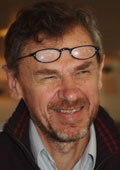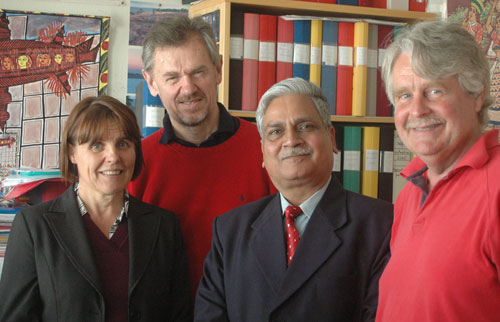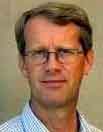SWEDISH SOUTH ASIAN STUDIES NETWORK
School of Social Sciences, Linnaeus University, Växjö
On January 1, 2010, Kalmar University and Växjö University were amalgamated and formed Linnaeus University ![]()
Postal address: Institutionen för samhällsvetenskap,
Linnéuniversitetet, SE-351 95 Växjö, Sweden
Visiting address: Georg Lückligs väg 8, House K, Entrance 4, Teleborg
Web page: http://www.vxu.se/svi/english/
The School of Social Sciences offers educational programmes in the subjects of: • Media and Communication Studies; • Sociology; • Political Science; • Geography; • Physical Geography; • Human Geography; • Social Psychology; • Psychology; and • Peace and Development Studies. The School of Social Sciences have approximately 110 people employed.
South Asia related research at School of Social Sciences
 Dr. Krister Håkansson is based at the Dept. of Psychology within the School of Social Sciences. Besides is also working at Karolinska Institutet Medical University in Stockholm. His research interests include Cross-cultural Psychology. More information from his personal web page.
Dr. Krister Håkansson is based at the Dept. of Psychology within the School of Social Sciences. Besides is also working at Karolinska Institutet Medical University in Stockholm. His research interests include Cross-cultural Psychology. More information from his personal web page.
Krister Håkansson has become involved in organising a conference on the introduction of solar energy to villages in northern India. The conference titled ”Implementation strategies for the transfer of hybrid photovoltaic-thermal technology (H-PV/T) from research to lab to field” was in New Delhi 25–28 August 2009.
The conference, partly funded by SASNET, should have been organised by Late Professor Om Prakash at the Dept. of Mechanical Engineering, School of Technology and Design,
Växjö University, in collaboration with the Indian Institute of Technology (IIT) Delhi. However, due to bad health (he actually passed away in the summer 2009) Prof. Prakash could not realise the project, and the responsibilty was then handed over to Krister Håkansson, with whom there already existed collaboration.
The workshop was jointly organised by the Indian Institute of Technology (IIT) Delhi, the Bag Energy Research Society (BERS) in India, and Växjö University, Sweden, and the participants came from all over India, and included farmers from rural areas, maintenance engineers, social scientist/workers, technical experts and representatives of different NGO:s. Full information about the conference. ![]()
![]() The workshop is then supposed to function as an incitament to introduce solar energy in Indian villages without electricity. Different aspects – technical as well as social and cultural will be discussed. Persons working or having knowledge of solar energy technologies in the area related to agriculture in remote area will be invited to the conference, where participants first learn the technologies with practicals and convinced to desire to work in future with our networking groups, and NGO representatives can share their experience with problem faced by them during implementation of such technologies in rural areas.
The workshop is then supposed to function as an incitament to introduce solar energy in Indian villages without electricity. Different aspects – technical as well as social and cultural will be discussed. Persons working or having knowledge of solar energy technologies in the area related to agriculture in remote area will be invited to the conference, where participants first learn the technologies with practicals and convinced to desire to work in future with our networking groups, and NGO representatives can share their experience with problem faced by them during implementation of such technologies in rural areas.
Tentively the following two future venues for implementation of the project have been proposed, namely one rural area, Ballia in the state of Uttar Pradesh, and one medium-sized city, Varanasi also in Uttar Pradesh.
 |
| Anna Lindberg, SASNET, Krister Håkansson, Växjö University, G.N. Tiwari, IIT Delhi, and Lars Eklund, SASNET. |
Being a psychologist, Krister Håkansson is interested to launch a broad interdisciplinary research project on issues connected to village development and the introduction of solar energy, but also other possible research topics. SASNET’s deputy director Lars Eklund visited Växjö University in March 2009 and discussed this with Dr. Håkansson (read Lars Eklund’s report). ![]()
In May 2009, the Indian collaboration partner, Prof. G.N. Tiwari from the Centre for Energy Studies at Indian Institute of Technology (IIT) Delhi visited Växjö University in order to discuss the final planning for the conference to be held at IIT Delhi. During his visit he held a lecture on Wednesday 20 May 2009, entitled ”Sustainable Energy Alternatives. Renewable Energy Research at Solar Energy Park, IIT, Delhi”. ![]()
The day before, Prof. Tiwari and Dr. Håkansson travelled down to Lund, and visited SASNET’s root node office. Discussions were held with Anna Lindberg and Lars Eklund from SASNET. (Photo to the right)
 Professor Emil
Uddhammar is based at the Dept. of Political Science within the School of Social Sciences. He was appointed
Professor at Växjö University in 2006. Before that, he worked
at the Dept. of Government, Uppsala University. More
information about his Uppsala research.
His research interests are democracy and institutions,
institutions and development, conservation and development and
also Swedish politics and political theory. More information from his personal web page.
Professor Emil
Uddhammar is based at the Dept. of Political Science within the School of Social Sciences. He was appointed
Professor at Växjö University in 2006. Before that, he worked
at the Dept. of Government, Uppsala University. More
information about his Uppsala research.
His research interests are democracy and institutions,
institutions and development, conservation and development and
also Swedish politics and political theory. More information from his personal web page.
Prof. Uddhammar has been involved in research projects focusing on East Africa, but also in comparative studies with India. One such project was a comparative research study on Development
and biodiversity in East Africa and India, a
project funded by the Swedish Research Council for the period 2005-07.
It focused on the impact different institutional arrangements – political,
legal and economic – had on bio-diversity and human development.
In India
Dr. Uddhammar collaborated with Dr. Vikram
Dayal, Research Associate at TERI,
the Energy and Resources Institute in New Delhi. More
information on the project.
In March 2007, Prof. Uddhammar and the School of Social Sciences, Växjö University, received a small Linnaeus Palme International Exchange Programme grant from the Swedish International Programme Office for Education and Training for the contract period 1 July 2007– 30 June 2008. The grant should be used to develop an exchange of students and teachers between Växjö and TERI in New Delhi. More information about the Linnaeus Palme grants 2007.
In December 2008, Dr. Nilanjan Ghosh, Senior Vice President at MCX Academia of Economic Research (MAER), Mumbai, India was invited to the department in Växjö by Prof. Uddhammar for a week. Dr. Ghosh obtained his doctorate from the Indian Institute of Management (IIM) in Kolkata and later been a researcher and lecturer at the TERI Institute in New Delhi. Presently as Senior Vice President, he heads the research, consultancy, and publications initiatives of MAER, an economic research and consultancy centre at the Multi Commodity Exchange of India Limited (MCX) in Mumbai. Nilanjan Ghosh is involved in projects/ consultancies sponsored by the Swedish Research Council, FORMAS, UNEP (Nairobi), World Bank, CDEP (IIM–Kolkata), IUCN, UNCTAD, and others.
A research seminar on ”Trans-boundary water disputes” was held at the School of Social Sciences on Tuesday 2 December 2008. Dr. Ghosh presented a paper titled ”A scarcity value based explanation of trans-boundary water disputes: the case of the Cauvery River Basin in India”. The issue is at the forefront of the global environmental debate, not least because scarce water resources could lead to conflicts. Efficient management of such resources and appropriate institutional arrangements are hot topics. ![]()
SASNET - Swedish South Asian
Studies Network/Lund University
Address: Scheelevägen 15 D, SE-223 70 Lund, Sweden
Phone: +46 46 222 73 40
Webmaster: Lars Eklund
Last updated
2010-02-11
